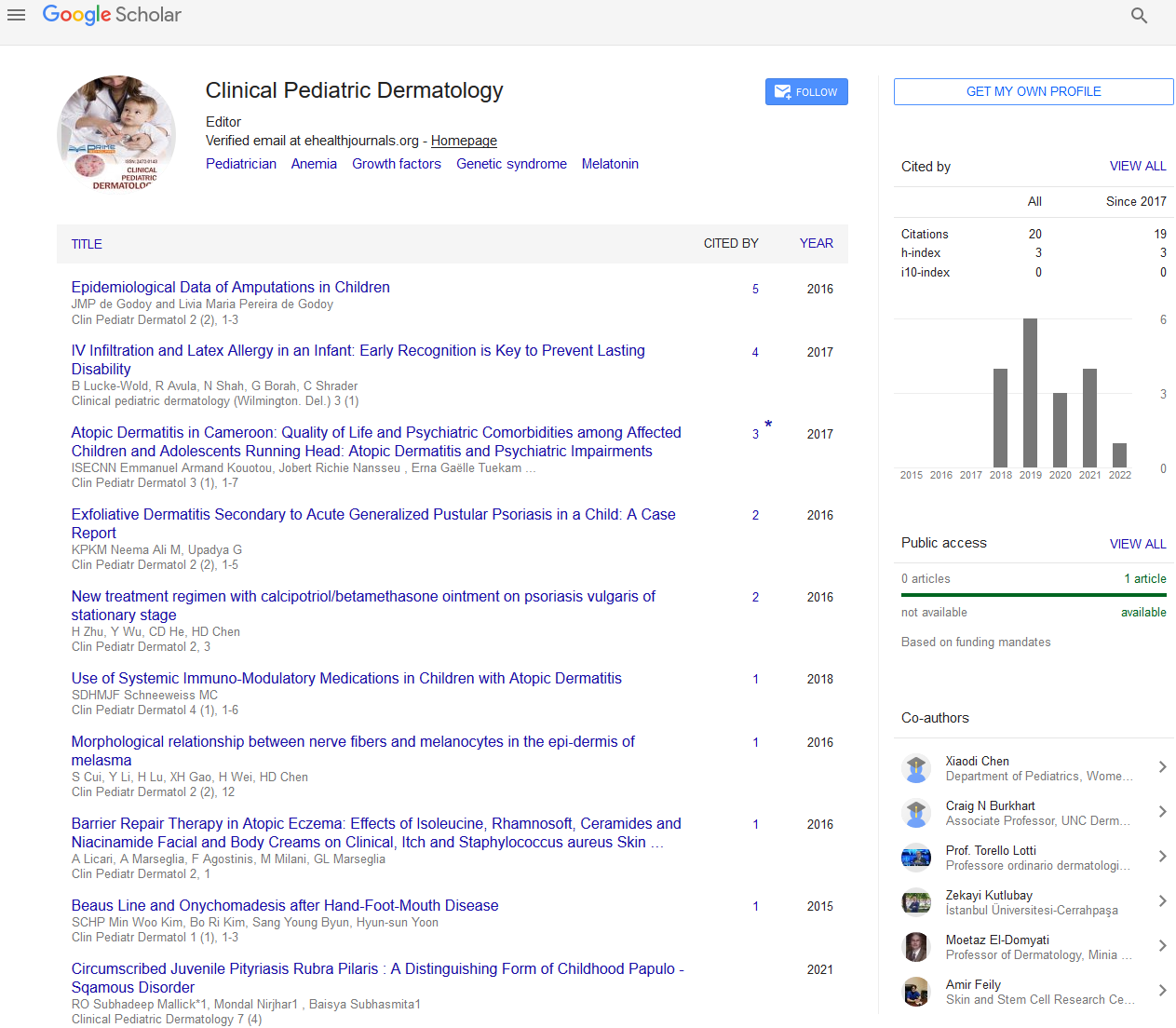Commentary - (2022) Volume 8, Issue 5
Cosmetics are an Important Part of Human Society
Robert Roca*
Department of Dermato-Cosmetology, University of Brussel, Belgium
*Correspondence:
Robert Roca,
Department of Dermato-Cosmetology, University of Brussel,
Belgium,
Email:
Received: 03-Oct-2022, Manuscript No. IPCPDR-22-15083;
Editor assigned: 05-Oct-2022, Pre QC No. IPCPDR-22-15083 (PQ);
Reviewed: 19-Oct-2022, QC No. IPCPDR-22-15083;
Revised: 24-Oct-2022, Manuscript No. IPCPDR-22-15083 (R);
Published:
31-Oct-2022, DOI: 10.36648/2472-0143.22.8.022
Description
Cosmetics consist of mixtures of naturally occurring or synthetically
produced compounds. Cosmetics serve different purposes.
Those intended for personal care and skin care can be used to
cleanse or protect the body and skin. It can be used to accentuate
a person’s natural features (such as eyebrows and eyelashes), add
colour to a person’s face, or perfectly mimic the appearance of a
person’s face. In recent years, cosmetic scientists and related workers
have actively attempted to advance this field. Professionalism
and ethics are a big part of the field, with public outcry against
animal testing and the use of animals in the manufacture of cosmetics.
These products may be intended for use in skin care, body
care, or to modify appearance. A subgroup of cosmetics known as
make-up refers primarily to products containing colour pigments
intended to alter the wearer’s appearance. Some manufacturers
only distinguish between “decorative” cosmetics intended to modify
appearance and “care” cosmetics intended for skin and body
care. Cosmetic ingredients are derived from a variety of sources,
but unlike food ingredients, they are often overlooked by most
consumers. Cosmetics in their various forms date back to early civilizations,
when the need to enhance one’s personal appearance
was a key factor in attracting a mate. Ingredients changed dramatically
as they discovered how to create fragrance and cosmetic
formulas for the world. The perception of the dangers of many
common ingredients has also had a major impact on the growing
industry. Skin care cosmetics can not only be used to cleanse, exfoliate
and protect the skin, but also can be used to replenish the
skin with cleansers, toners, serums, moisturizers and balms. The
more common are shampoos and shower gels. Cosmetics intended for personal care can be used for cleansing the body. In addition
to brushes, makeup sponges are also popular applicators. Typical
cosmetics contain various organic and inorganic compounds. Typical
organic compounds are modified natural oils and various active
ingredients derived from petrochemicals. Zinc iron oxides belong
to pigments, that is, dyes that are insoluble in solvents. Cosmetic
companies are becoming more transparent about the ingredients
in their products due to consumer interest in their product formulations.
Certain chemicals in some skin care products can be
harmful if absorbed through the skin. Products claiming to be organic
must be USDA Organic certified in the United States. One of
the most popular traditional Chinese herbal medicines is Tremella
fusiform is mushroom, used by Chinese and Japanese women
as a beauty product. The word cosmetic comes from the Greek
(kosmetikos), meaning “talent of order or placement”. Archaeological
evidence confirms its use in cosmetics in ancient Egypt and
Greece. Cosmetics used are: Castor oil was used in ancient Egypt
as a protective balm. A skin cream made from beeswax, olive oil
and rose water used by the Romans. 19th century petrolatum and
lanolin. Nivea Creme was the first stable water-in-oil emulsion
launched in 1911. The ancient Greeks also used cosmetics. Cosmetics
also appear in the Old Testament. Men who think makeup
is dishonest may call it fake.
Acknowledgement
None.
Conflict Of Interest
Author declares that there is no conflict of interest.
Citation: Roca R (2022) Cosmetics are an Important Part of Human Society. Clin Pediatr Dermatol. 8:022.
Copyright: © 2022 Roca R. This is an open-access article distributed under the terms of the Creative Commons Attribution License,
which permits unrestricted use, distribution, and reproduction in any medium, provided the original author and source
are credited.

